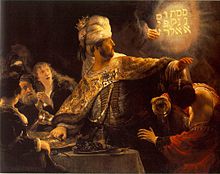Belshazzar
| Bēl-šarra-uṣur | |
|---|---|
| Co-regent king of Babylon | |

Rembrandt's depiction of the biblical account of Belshazzar seeing "the writing on the wall"
|
|
| Reign | 550-539 BCE |
| Predecessor | Nabonidus |
| Successor | Cyrus the Great |
| Died | 539 BCE Babylonia |
| Father | Nabonidus |
| Mother | poss. |
Belshazzar (/bɛlˈʃæzər/; Biblical Hebrew בלשאצר; Akkadian: Bēl-šarra-uṣur; Greek: Balthazar, from Akkadian, "Bel Protect the King";) was Co-regent of Babylon, governing the country after his father, King Nabonidus, went into exile in 550 BCE. Belshazzar died after Babylon fell to the Persians in 539 BCE.
According to the Book of Daniel, Belshazzar holds a last great feast at which he sees a hand writing on a wall with the Aramaic words mene, mene, tekel, upharsin, which Daniel interprets as a judgment from God foretelling the fall of Babylon.
Chapter 5 of the book of Daniel tells the story of Belshazzar and the writing on the wall. In the story, Belshazzar holds a feast, during which Belshazzar intends his guests to drink from the temple treasures from Jerusalem while praising Babylonian gods. He then sees a hand writing on the palace wall. Daniel is called to interpret the writing after Belshazzar's wise men are unable.
The inscriptions of the Edict of Balshazzar (YBT 6 103) gives Belshazzar the title "crown prince". The Aramaic Qumran scroll 4Q243 fragment 2; Lines 1–2 names Belshazzar as vice-regent in Babylon during the absence of Nabonidus, while the book of Daniel gives Belshazzar's title as "king" (Dan. 5:1–30).
Since the 19th century, some historians such as Robert Dick Wilson and W. H. Stevenson have disputed Belshazzar's reign as a king. Both Wilson and Stevenson do, however, acknowledge Belshazzar as a legitimate historic figure. In the Babylonian chronicles, Belshazzar is commanding the armies in the North while Nabonidus remains in Babylon. Later, after a break in the inscription, Nabonidus is with the army. John H. Raven suggests that while Nabonidus was with the Army, Belshazzar could have been placed in authority at the Capitol. Thus, it would support Daniel's position as being "third ruler of the kingdom" (Daniel 5:29) since Belshazzar was second only to his father. Despite the overwhelming evidence that Robert D. Wilson had uncovered concerning Belshazzar's subordinate functions to Nabonidus, John H. Raven argues that Belshazzar would have been addressed as king and spoken of as such.
...
Wikipedia
